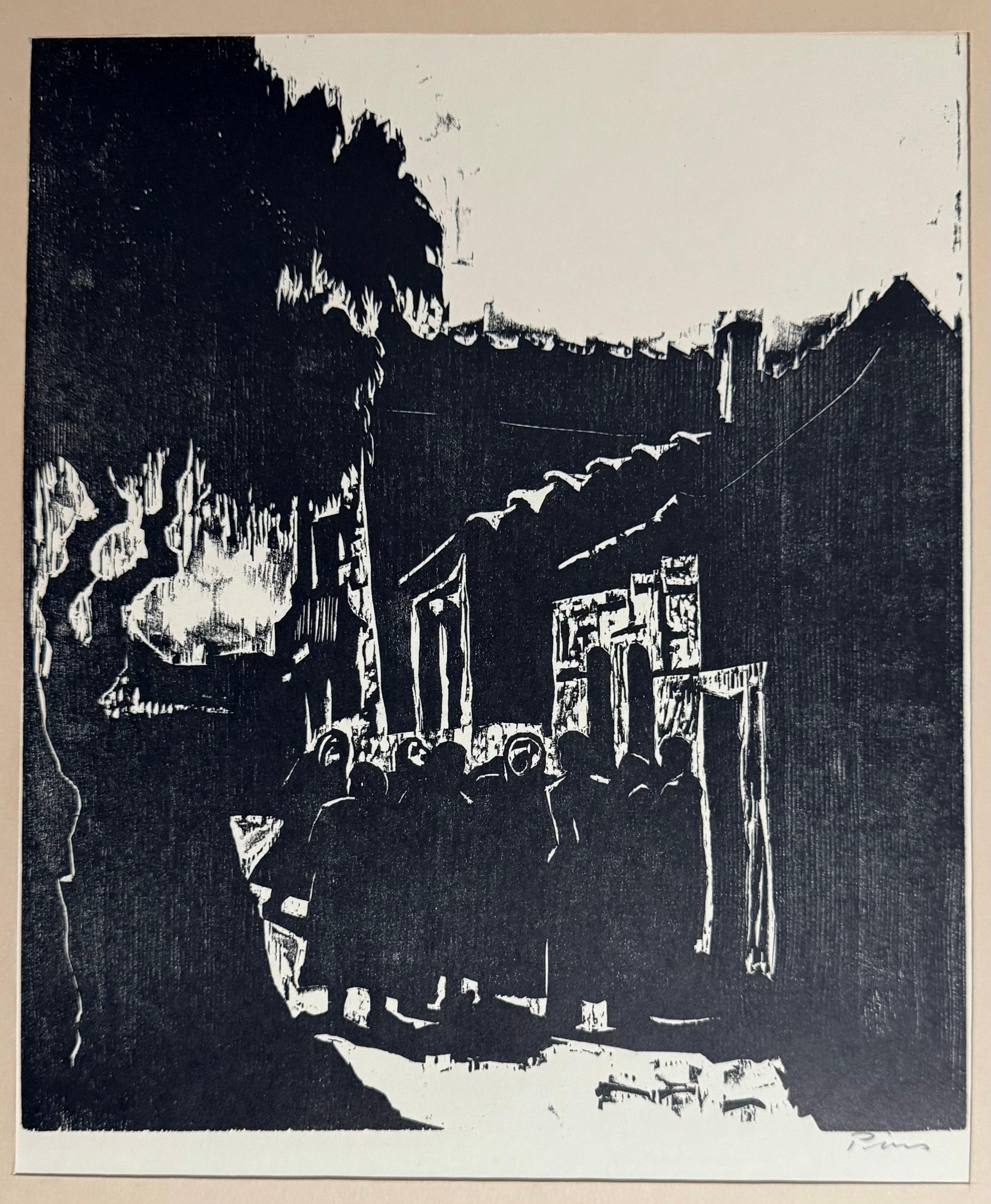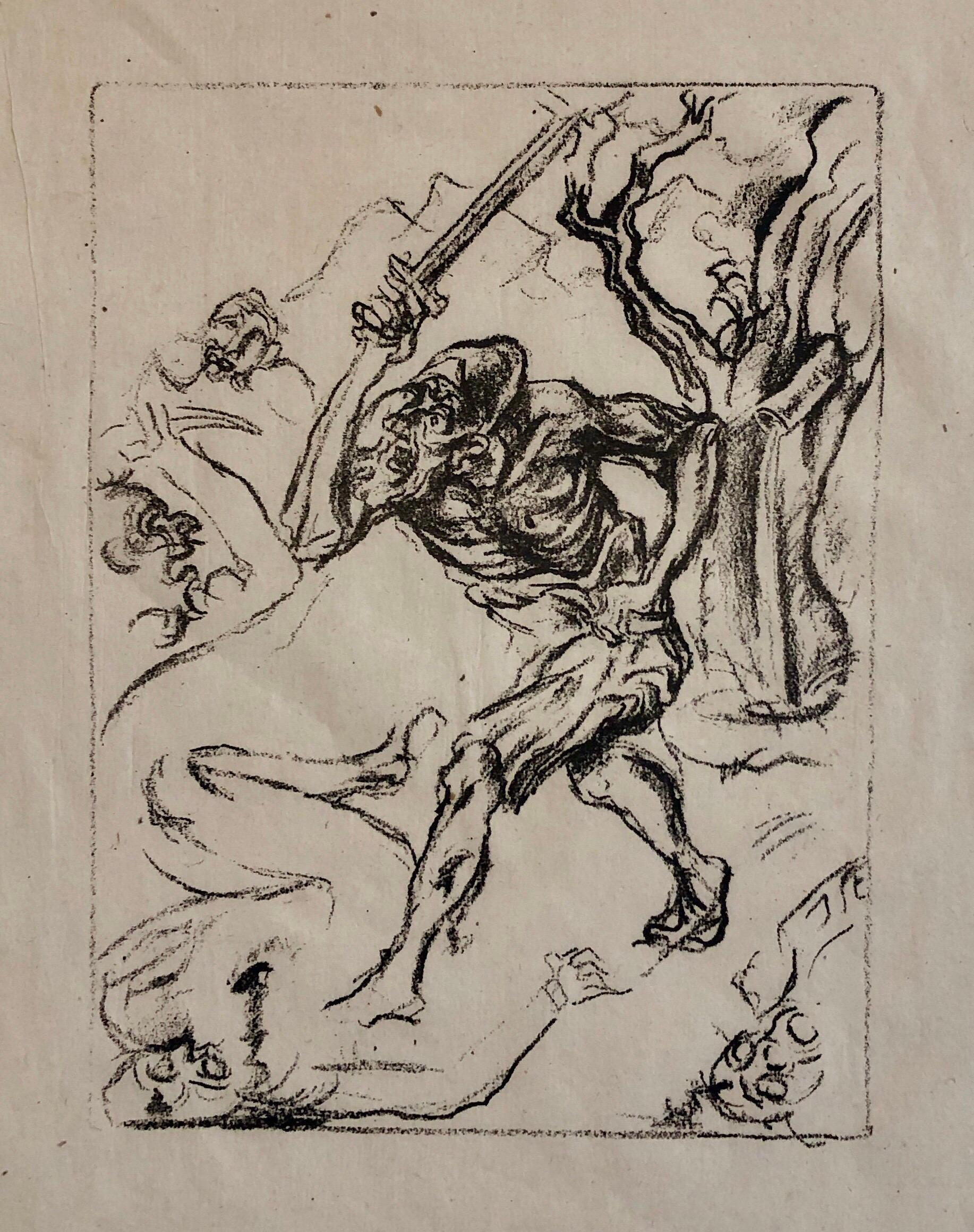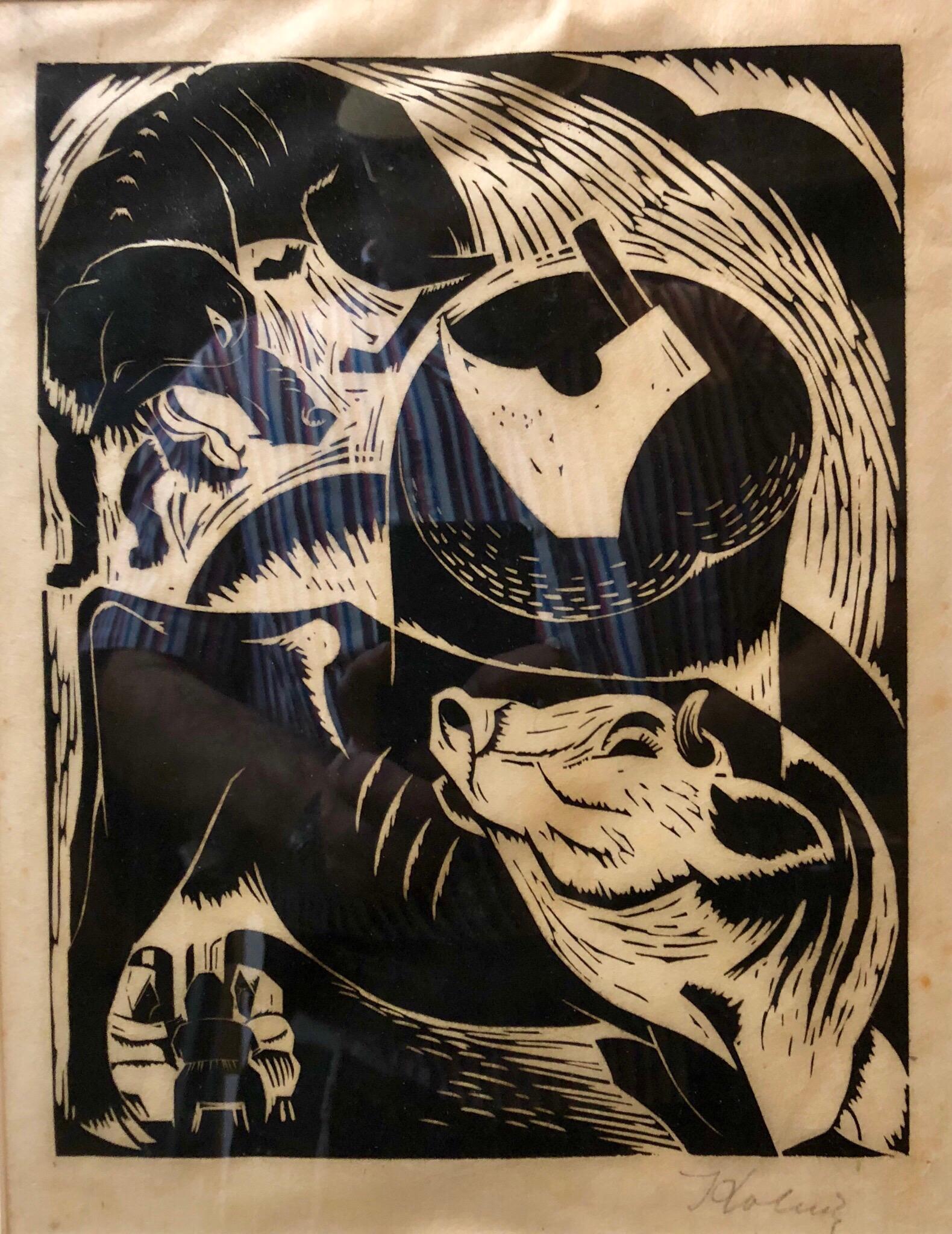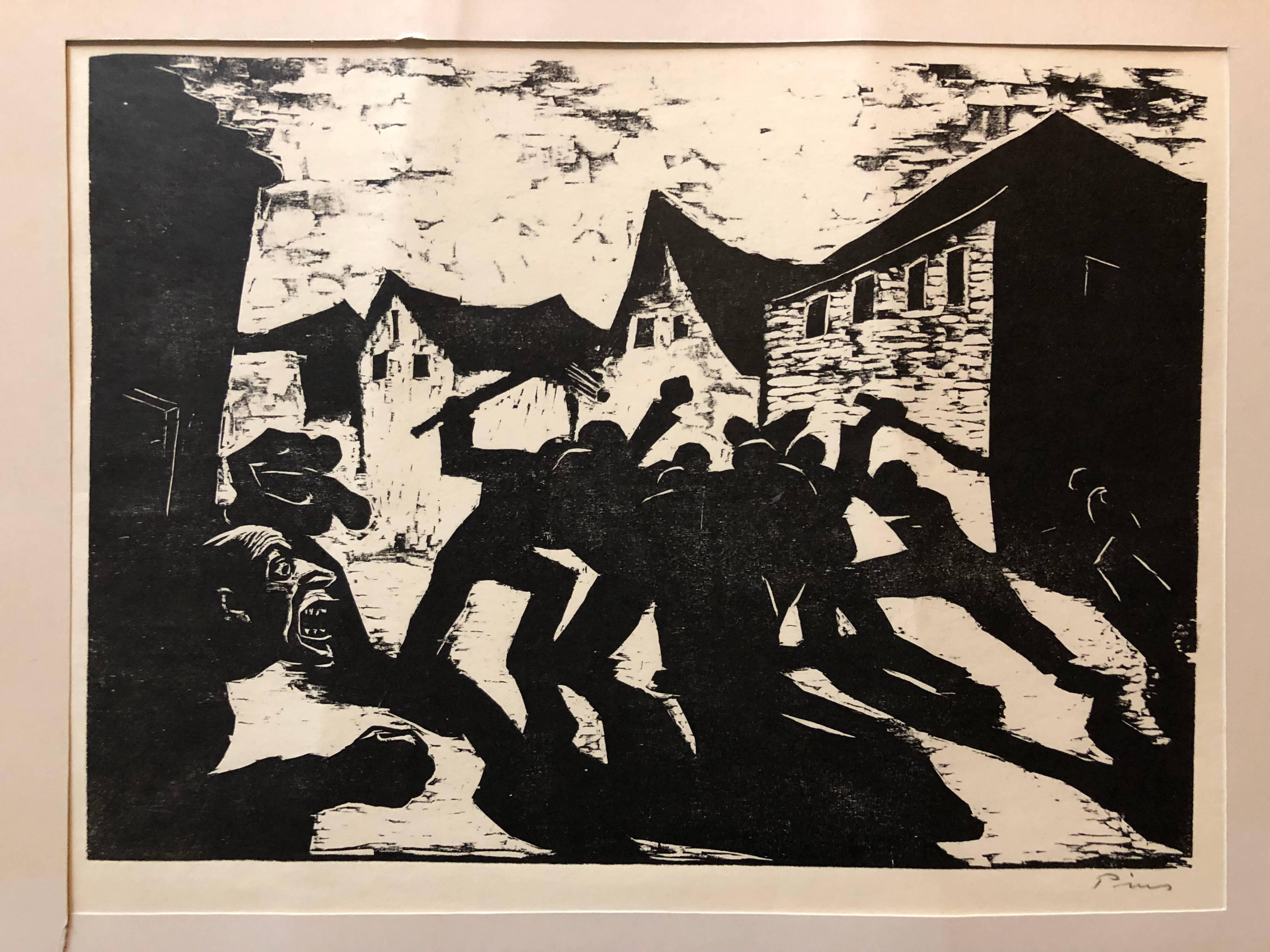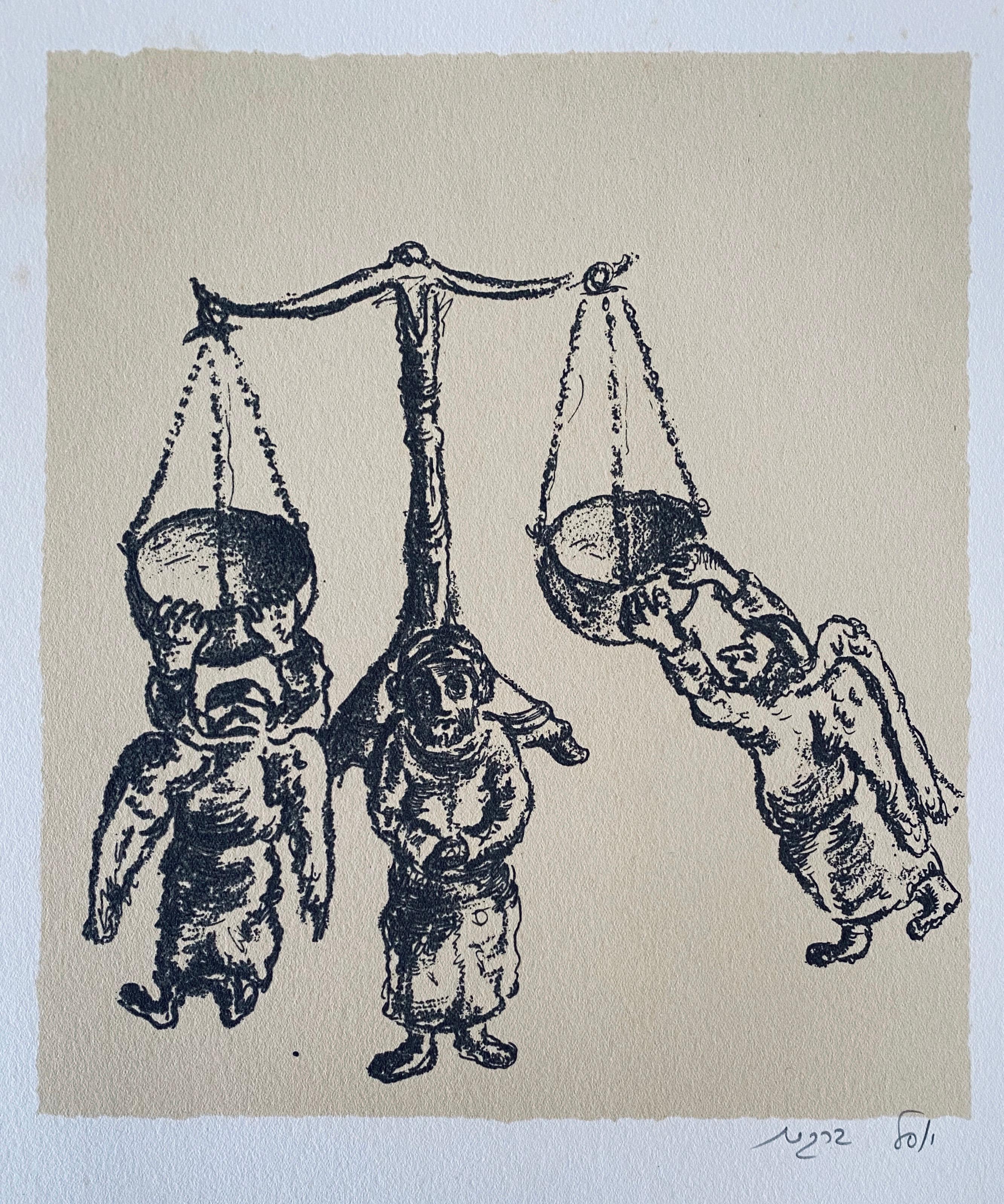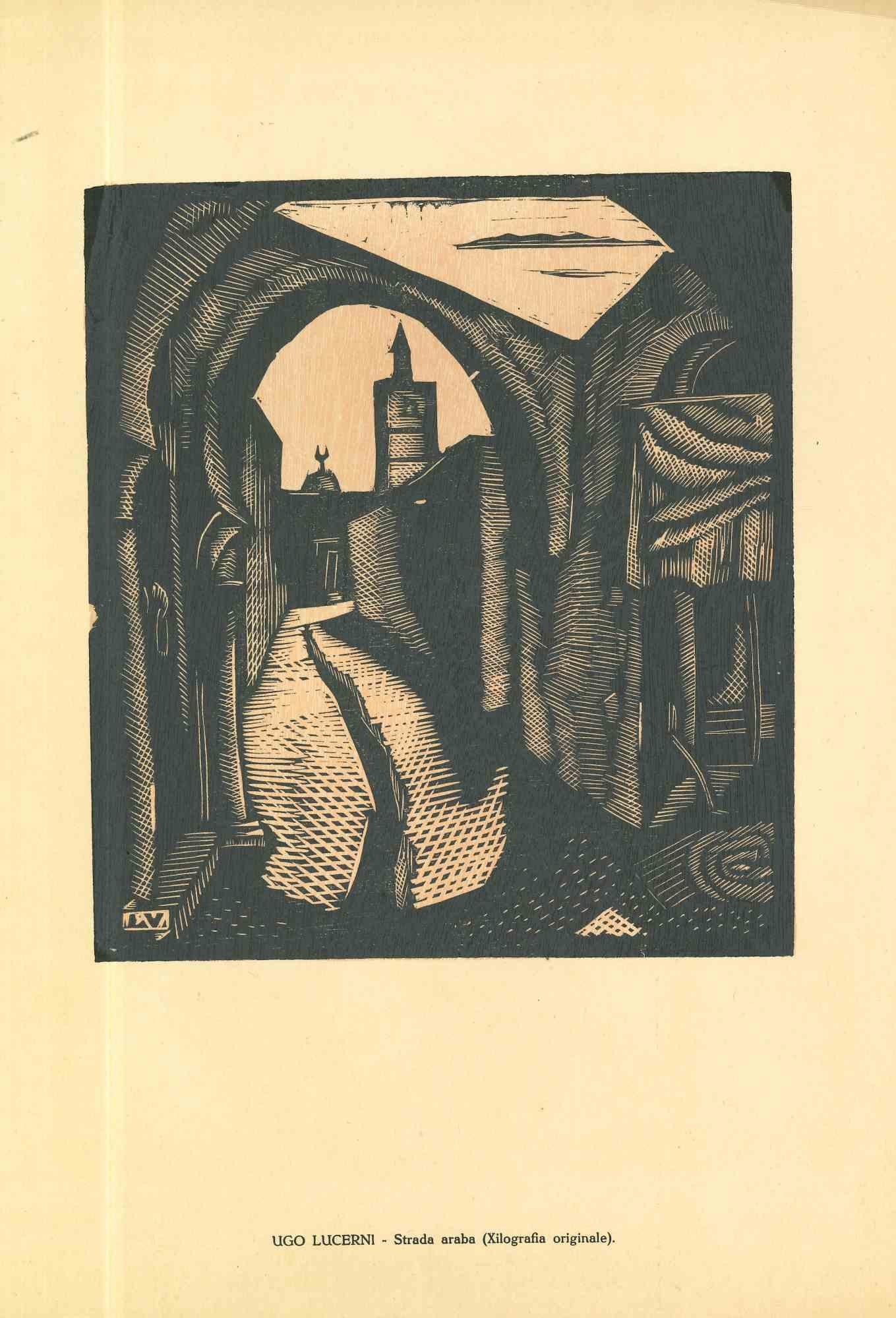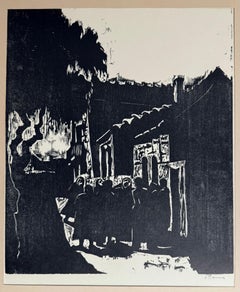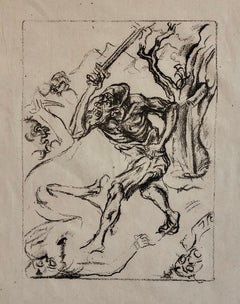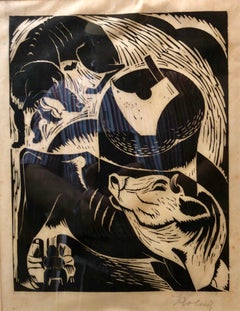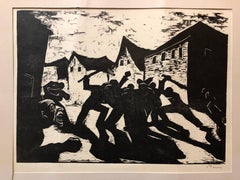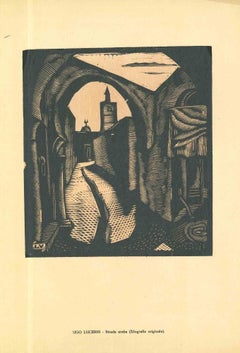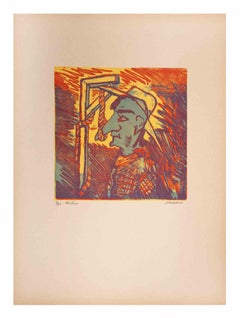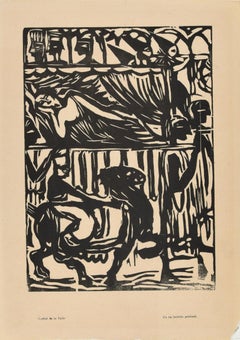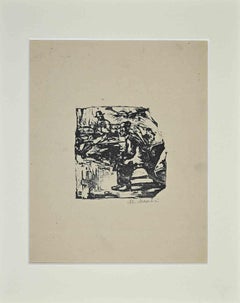Items Similar to 1943 Israeli German Expressionist Woodcut Print Vintage Woodblock Bezalel School
Want more images or videos?
Request additional images or videos from the seller
1 of 5
Jacob Pins1943 Israeli German Expressionist Woodcut Print Vintage Woodblock Bezalel School1943
1943
$550
£416.26
€477.96
CA$783.52
A$849.75
CHF 446.32
MX$10,321.67
NOK 5,584.98
SEK 5,258.57
DKK 3,568.27
About the Item
Jacob Otto Pins (17 January 1917 – 4 December 2005) was a German-born Israeli woodcut artist and art collector, particularly of Japanese prints and paintings.
Jacob Pins was born in Höxter, Germany, the son of Dr Leo Pins, a veterinarian, and his wife Ida Lipper. He immigrated to Palestine in 1936 to study art. His father tried to discourage him from becoming an artist for financial reasons.
Pins' younger brother, Rudolph, (1920-2016) moved to the United States in 1934. His father was sent to Buchenwald. In July 1944, both parents died in the Riga ghetto.
Pins first lived on a kibbutz, which was disbanded in 1941. He moved to Jerusalem and studied woodcut and linocut under woodcut master and painter Jacob Steinhardt, also a German immigrant, at his small private school. He lived in poverty in a tiny room, subsisting on a meagre diet. He continued his studies at the new Bezalel Academy of Art and Design.
Pins was married to Elsa, the subject of a number of his prints. They had no children.
Pins bought his first Oriental print in 1945, and acquired a house on Ethiopia Street, opposite the Ethiopian church, where he lived for the rest of his life. He continued collecting until his death and was one of Israel's foremost art collectors. His book on Japanese Pillar Prints, Hashira-e is the definitive work on the subject.
Pins died in Jerusalem in December 2005.
Pins' artwork was heavily influenced by German expressionism and traditional Japanese wood block printing. From 1956 to 1977, he taught at Israel's leading art schools, most notably Bezalel, where he later became a professor. He was known as a demanding teacher, emphasizing strong technical skills and discipline.
In the 1950s, Pins helped to found the Jerusalem Artists' House, a centre for the city's artists to meet and exhibit.
Legacy
Pins' extensive collection of Japanese woodprints, paintings and sculptures was left to the Israel Museum, where it forms the Jacob Pins Collection. Most of his own artwork was left to his home town and the Forum Jacob Pins museum opened there in 2008. Nimrod Erez made a feature-length documentary about Pins, and this is in the permanent collection of MOMA, New York. A shorter documentary is on exhibition at the Jacob Pins Forum, Höxter.
Exhibitions
Jacob Pins: Woodcuts: Herzliya Museum of Art, December 92 - January 93
Published works
Jacob Pins Woodcuts. Exhibition catalog, Boston, Boston Public Library, 1953. Paperback, 15 pp with six black and white woodcuts.
Master woodcuts by Jacob Pins. Oblong octavvo, staples paper covers, 12pp., b/w illustrations. Introduction by Ruth Eis. A short catalog of the exhibition, May 5-June 30, 1974, Judah L. Magnes Museum, Berkeley, California, 1974
The Japanese Pillar Print, Hashira-e London Robert G Sawers Publishing, 1982, 389 pages, 14 pages in color and 1039/XXV11 illustrations in black and white.
The Pins Collection: Chinese and Japanese paintings and prints. Israel Museum, Israel, 1980
The Jacob Pins Collection of Japanese Prints, Paintings and Sculptures. Israel Museum (Jerusalem) 1994
Artistes de Jerusalem Artists' House, Jerusalem 1949
Artists: Jacob Eisenberg, David Palombo, Lehmann, Rudolph (Rudi) Lev, Jacob Zeev Ben Zvi, Fima (Roytenberg, Ephraim) Zev Raban, Anna Ticho, Jakob Steinhardt, Grete Wolf Krakauer, Joseph Budko, Isidor Aschheim, Ludwig Jonas.
- Creator:Jacob Pins (1917 - 2005, German, Israeli)
- Creation Year:1943
- Dimensions:Height: 6 in (15.24 cm)Width: 9 in (22.86 cm)
- Medium:
- Movement & Style:
- Period:
- Condition:good. minor wear. minor wrinkling. see photos.
- Gallery Location:Surfside, FL
- Reference Number:1stDibs: LU38214056672
About the Seller
4.9
Platinum Seller
Premium sellers with a 4.7+ rating and 24-hour response times
Established in 1995
1stDibs seller since 2014
1,815 sales on 1stDibs
Typical response time: 1 hour
- ShippingRetrieving quote...Shipping from: Surfside, FL
- Return Policy
Authenticity Guarantee
In the unlikely event there’s an issue with an item’s authenticity, contact us within 1 year for a full refund. DetailsMoney-Back Guarantee
If your item is not as described, is damaged in transit, or does not arrive, contact us within 7 days for a full refund. Details24-Hour Cancellation
You have a 24-hour grace period in which to reconsider your purchase, with no questions asked.Vetted Professional Sellers
Our world-class sellers must adhere to strict standards for service and quality, maintaining the integrity of our listings.Price-Match Guarantee
If you find that a seller listed the same item for a lower price elsewhere, we’ll match it.Trusted Global Delivery
Our best-in-class carrier network provides specialized shipping options worldwide, including custom delivery.More From This Seller
View AllGerman Expressionist Woodcut Print Pencil Signed israeli Jerusalem Jacob Pins
By Jacob Pins
Located in Surfside, FL
Jacob Otto Pins (17 January 1917 – 4 December 2005) was a German-born Israeli woodcut artist and art collector, particularly of Japanese prints and paintings.
Jacob Pins was born in ...
Category
20th Century Expressionist Figurative Prints
Materials
Woodcut
Jakob Steinhardt Jewish German Expressionist Lithograph Israeli Early Bezalel
By Jacob Steinhardt
Located in Surfside, FL
plate signed.
Jacob Steinhardt
1887-1968
Steinhardt, Jakob, Painter and Woodcut Artist. b. 1887, Yaacov Steinhardt was born in the then remote, largely Polish town of Zerkow in the Posen District of Germany. (poland/german) Immigrated 1933. Studies: 1906 School of Art, 1906 Studied in Berlin Arts and Crafts School. Berlin; 1907 painting with Lovis Corinth and engraving and etching with Hermann Struck; advanced studies, 1908-10 Paris, with Henri Matisse and Steinlen; 1911 Italy. Teaching: Bezalel, Jerusalem, 1953-57 Director. 1910 Participated in the “New Sezession”, Berlin. 1912 together with Ludwig Meidner and Janthur he founded the "Pathetiker" group very early in the German expressionist movement. Running afoul of the Nazis, he fled to Tel-Aviv and then Jerusalem in the early 30s, showing in “Der Sturm” Gallery. 1914 Exhibited with ludwig Meidner at first Expressionist Exhibition in Berlin. Worked mainly in woodcuts depicting biblical and other Jewish subjects. 1955-58 International awards for his woodcuts. receives graphic commissions from Fritz Gurlitt. 1922 Marries Minni Gumpert. Active in organizing Secession exhibits. 1925 Trips to Mark Brandenburg and Holy Land. Turns primarily to painting; stops work on etchings and lithographs. 1933 Emigrates to the Palestine. 1934 Moves to Jerusalem and opens an art school; attempts some etchings. 1948 Closes the art school and becomes Chairman of Graphics Department, Bezalel School for Arts and Crafts. 1954-57 Director of Bezalel School for Arts and Crafts. Taken up by J. B. Neumann who became the agent for his etchings. Exhibited Sturm Gallery, Herbst-salon. 1914 Outbreak of World War I; Steinhardt enlists in German army. 1916-18 First on Eastern Front in Poland and Lithuania, then after short training period in Berlin, sent to Macedonia. 1917 Exhibition of Lithuanian drawings at Berlin Secession in Spring. Elected member of the Secession.
He often used wood-cutting techniques that were popular amongst German Expressionists. Steinhardt was driven to express ideas clearly and decisively through art.
Amongst the themes found in his work the prophets of the Bible, such as Jonah, are noticeable. Steinhardt identified deeply with Jonah due to his attempt to run from God's call to duty.
Additionally, the image of beggars was often found in Steinhardt's works and in his artistic presentation of the less fortunate, the artist's love for his fellow man becomes evident.
Moreover, the grotesque was a theme noticeable in Steinhardt's earliest pieces. These were fantastical images; it was unclear whether or not they were human or demon. In the 1950's, Steinhardt returned to these images upon learning of the Holocaust of Europe's Jews. At that time he resided in New York and there, in the shadow of the skyscrapers, Steinhardt's reaction to WWII was expressed through his art.
A Collection of Works by Artists of the Land of IsraelThe Bezalel National Museum, Jerusalem 1940 Artists: Shemi, Menahem Rubin...
Category
20th Century Expressionist Figurative Prints
Materials
Woodcut
Polish French Expressionist Judaica Woodcut Had Gadya from Passover Haggadah
By Arthur Kolnik
Located in Surfside, FL
Arthur Kolnik, Jewish painter and printmaker Ivano-Frankivsk (Ukraine) 1890 - Paris (France) 1972
Arthur Kolnik was born in Stanislavov, a small town in Galicia, which was then part of the Austro-Hungarian Empire. His father, who was originally from Lithuania, worked as an accountant and his mother, who was originally from Vienna, ran a shop. In 1905, he discovered Yiddish literature in Czernowitz, on the occasion of the first conference on Yiddish language, which was organized by several writers including I. L. Peretz, Cholem Aleichem, Shalom Asch, and Nomberg.
In 1909, Kolnik joined the School of Fine Arts in Krakow and took classes taught by Jacek Malezcewski and Joseph Mehoffer, a portrait painter and an artist who produced stained-glass windows in Fribourg (Switzerland).
He was mobilized in the Austrian army in 1914. He was wounded in 1916 and repatriated to Vienna, where he met the Judaic painter Isidor Kaufmann. In 1919, Kolnik settled in Czernowitz, which was then annexed by Romania. There, he met writer and poet Itzik Manger and storyteller Eliezer Steinberg for whom he produced several illustrations. In 1920, Kolnik left for the United States, bringing fifty paintings...
Category
20th Century Expressionist Figurative Prints
Materials
Woodcut
German Israeli Expressionist Woodcut Print Pencil Signed Street Fight
By Jacob Pins
Located in Surfside, FL
Jacob Otto Pins (17 January 1917 – 4 December 2005) was a German-born Israeli woodcut artist and art collector, particularly of Japanese prints and paintings.
Jacob Pins was born in Höxter, Germany, the son of Dr Leo Pins, a veterinarian, and his wife Ida Lipper. He immigrated to Palestine in 1936 to study art. His father tried to discourage him from becoming an artist for financial reasons.
Pins' younger brother, Rudolph, (1920-2016) moved to the United States in 1934. His father was sent to Buchenwald. In July 1944, both parents died in the Riga ghetto.
Pins first lived on a kibbutz, which was disbanded in 1941. He moved to Jerusalem and studied woodcut and linocut under woodcut master and painter Jacob Steinhardt, also a German immigrant, at his small private school. He lived in poverty in a tiny room, subsisting on a meagre diet. He continued his studies at the new Bezalel Academy of Art and Design.
Pins was married to Elsa, the subject of a number of his prints. They had no children.
Pins bought his first Oriental print in 1945, and acquired a house on Ethiopia Street, opposite the Ethiopian church, where he lived for the rest of his life. He continued collecting until his death and was one of Israel's foremost art collectors. His book on Japanese Pillar Prints, Hashira-e is the definitive work on the subject.
Pins died in Jerusalem in December 2005.
Pins' artwork was heavily influenced by German expressionism and traditional Japanese wood block printing. From 1956 to 1977, he taught at Israel's leading art schools, most notably Bezalel, where he later became a professor. He was known as a demanding teacher, emphasizing strong technical skills and discipline.
In the 1950s, Pins helped to found the Jerusalem Artists' House, a centre for the city's artists to meet and exhibit.
Legacy
Pins' extensive collection of Japanese woodprints...
Category
20th Century Expressionist Figurative Prints
Materials
Woodcut
Israeli Expressionist Yosl Bergner Modernist Lithograph
By Yosl Bergner
Located in Surfside, FL
Hand signed in Hebrew Lower right. Dimensions: H 19.5" x 13.5"
Bergner, Yosl (Vladimir Jossif) (b Vienna, 13 Oct 1920). surrealist, surrealism. belongs to the generation of people...
Category
Mid-20th Century Modern Figurative Prints
Materials
Lithograph
Israeli Expressionist Yosl Bergner Modernist Lithograph
By Yosl Bergner
Located in Surfside, FL
Hand signed in Hebrew Lower right. Dimensions: H 19.5" x 13.5"
Bergner, Yosl (Vladimir Jossif) (b Vienna, 13 Oct 1920). surrealist, surrealism. belongs to the generation of people...
Category
Mid-20th Century Modern Figurative Prints
Materials
Lithograph
You May Also Like
Arab Street- Original Woodcut by Ugo Lucerni - Early 20th century
Located in Roma, IT
Arab Street is an original woodcut print realized by Ugo Lucerni in the early 20th century.
Good conditions.
The artwork is depicted through strong strok...
Category
Early 20th Century Modern Figurative Prints
Materials
Woodcut
Western - Woodcut by Mino Maccari - Mid-20th Century
By Mino Maccari
Located in Roma, IT
Western is an Artwork realized by Mino Maccari (1924-1989) in the Mid-20th Century.
Colored woodcut on paper. Hand-signed on the lower, numbered 1/89 specimens and titled on the le...
Category
Mid-20th Century Modern Figurative Prints
Materials
Woodcut
Persian Ballet - Original Woodcut Print by Arturo Martini - Early 20th Century
By Arturo Martini
Located in Roma, IT
Persian Ballet is a xylograph on ivory-colored, realized at the beginning of the XX century by the Italian artist Arturo Martini (Treviso, 1889 - Milan, 1947).
On the lower right ma...
Category
Early 20th Century Expressionist Figurative Prints
Materials
Woodcut
Historical Scene - Original Woodcut Print by Mino Maccari - Mid-20th Century
By Mino Maccari
Located in Roma, IT
Historical Scene is an original print realized by Mino Maccari in the Mid-20th Century.
Beautiful black and white woodcut print on ivory-colored paper. Included a passport: 35 x 28 ...
Category
Mid-20th Century Modern Figurative Prints
Materials
Woodcut
"Gespenstersonate" original woodcut
By Alfred Lomnitz
Located in Henderson, NV
Medium: original woodcut. Executed in 1920 for Das Kunstblatt, published in Berlin by Verlag Gustav Kiepenheuer. The total sheet measures 10 3/4 x 8 3/4 inches (275 x 210mm); the ima...
Category
1920s Expressionist Prints and Multiples
Materials
Woodcut
original woodcut
Located in Henderson, NV
Medium: original woodcut. This impression on wove paper was printed in 1919 for Das Kestnerbuch, an important collection of original prints published during the height of the German ...
Category
1910s Expressionist Prints and Multiples
Materials
Woodcut
More Ways To Browse
Expressionist Woodcut
Vintage Printing Blocks
Pins 1940
Black And White Woodcuts
German Woodcut
Vintage Eisenberg
German Expressionist Prints
Palombo David
Joseph Wolf
Jerusalem Sculpture
Japanese Wood Block
German Woodcut Prints
Vintage German Pins
Chinese Pin
Vintage Woodcut
German Expressionist Woodcut
Expressionist Woodblock Prints
German Woodblocks
